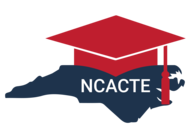

The North Carolina Association for Colleges of Teacher Education (NCACTE) would like to share recommendations regarding the licensure proposal currently under consideration by the Professional Education Preparation and Standards Commission (PEPSC). NCACTE membership institutions, both public and independent, will be impacted by this proposal; representatives from these institutions have been deeply engaged in this work since the launch of the PEPSC subcommittees.
In May 2021, NCACTE officially raised questions about the process and the proposal by sending a formal letter to PEPSC Chair Patrick Miller. Our questions primarily related to our perception of the reduced role of high-quality teacher preparation in the model and the impact of proposed “effectiveness” measures to assess teacher performance for salary increases. We were assured that our feedback would be considered for future revisions of the model.
In February 2022, NCACTE created a list of recommendations from our Advocacy & Policy Committee and sent it to our stakeholders, including PEPSC members.
In May 2022, NCACTE sent a final communication to PEPSC, again specifically raising questions about implementation and the overall viability of the proposal in the hopes that final subcommittee meetings would address these concerns.
From the beginning, NCACTE members have worked in good faith on the subcommittees and through public communications to be transparent about its strengths and our concerns with it. On the plus side, we support increasing compensation for all teachers, compensating student teachers, funding clearly structured advanced teaching positions that allow teachers to stay and lead in classrooms, and creating pathways for experienced teacher assistants to move into teaching positions with support.
However, as of August 1, there are still several areas of concern with the model. These have been shared in previous communications and remain unaddressed to date. As such, we outline our recommendations below. We observe that several of these recommendations also appear in documents from the Public School Forum of NC and NCAE.
Recommendations
- Elevate, rather than devalue EPP preparation in North Carolina.
Although the marketing materials tout the proposal as lifting up EPPs, in fact, we believe it does the opposite. Students who complete the traditional teacher training path will receive higher compensation in this proposal, but that group is shrinking. Traditional undergraduate enrollment in teacher education programs is decreasing in this state. Once our biggest source of future educators, our best and brightest high school students are now flocking to other professions. This has caused the state to double down on alternative entry programs (originally known as “lateral entry” programs). According to the NC DPI EPP Enrollment dashboard, alternative entry teacher enrollment in NC has increased 114% since 2015. Alternative entry teachers hold a bachelor’s degree and can be hired directly as teachers into the classroom. Current policies require these individuals to simultaneously enroll in an approved EPP and be trained in pedagogy, student learning needs, and engaging teaching practices. This is not an ideal situation; we all agree that in a perfect world, rigorous and supervised training would occur BEFORE an individual is given a classroom of children to teach. None of us would go to a doctor who had never been to medical school or a lawyer who had never taken a law class. Alternative entry policies were intended to be a band-aid, not a long-term solution.
Instead of incentivizing EPP completion prior to employment by offering stipends or free tuition and fees to those who opt to fully train as teachers, the Roundtable proposal doubles down on alternative entry as the future of teacher preparation. The Roundtable proposal allows alternative entry individuals to bypass an EPP altogether by way of “microcredentials,” online mini-lessons which are not yet developed (that we’ve seen) OR “another approved process” that also may qualify OR by passing certain tests OR by enrolling in an EPP program. This is like allowing a doctor to bypass medical school if they can pass the test at the end of the program without any training. Are there those who can do it? Sure. Is there more to becoming a doctor than being able to pass a test? Absolutely. We all rely on the rigorous standards of medical schools to determine if our doctors are qualified — we can trust in the training process to ensure our doctors have been observed and evaluated and are able to diagnose our ailments and treat them effectively. Shouldn’t the same be true of our teachers?
- Ensure quality teacher education through rigorous accreditation/program approval.
NC’s Educator Preparation Programs have been responsive to the teacher vacancy crisis. Even as policy disincentives (like stopping master’s pay and limited salary increases) have
contributed to the diminished teacher supply, EPPs have worked consistently to recruit and train quality teachers for NC classrooms. We have streamlined our programs to allow for quick completion with high quality, research-based preparation methods. We have designed affordable programs for second-career changers to pursue teaching as a profession. We established 2+2 programs with community college partners to increase and diversify pipelines to the profession. We have worked with our school partners to collaborate on tailored teacher recruitment programs and offered scholarships and funding for teacher training. We have been supportive of efforts to create fair accountability models for EPPs. In good faith and with the best of intentions, we have put our collective energies into putting qualified and trained teachers in North Carolina classrooms, even as enacted policies make our jobs more and more difficult. We have 50+ EPP programs in our state, many of them offering online options, reduced costs, and maximum flexibility. Many university-based EPP programs are accredited by either CAEP or AAQEP, thereby ensuring a high level of quality and rigor. EPP completers have extensive clinical experiences, including a 600-hour student teaching internship and a licensure recommendation process that involves observation and evaluation by the supervising teacher, the principal, and the university supervisor in a collaborative partnership. In NC, EPP completers stay longer in the profession than other pathways and are more successful.
We truly believe that no longer requiring EPP completion in lieu of less rigorous options is not “flexibility,” but rather a significant reduction in our standards for teacher preparation that will result in greater numbers of underprepared teachers leading classrooms. In recent years, the number of alternative licensing programs that function as businesses has increased (e.g., Teachers of Tomorrow, #TEACH, etc). These preparation providers tout themselves as high-quality solutions to the teacher shortage, but evidence suggests this is not the case. A recent report from AACTE shows that across the U.S. while many prospective teachers enroll in alternative preparation programs not based in higher education institutions, they are not producing the number of teachers needed to fill critical vacancies. In Texas, Teachers of Tomorrow (which also operates in North Carolina) was recently put on probation for their poor teaching practices. Are there some alternatively licensed teachers who are successful? Of course. But as policy, alternative licensure programs undeniably resulted in less credentialed and qualified teachers overall. The model may also inadvertently exacerbate inequities in NC classrooms. Research shows that children in less affluent communities are taught by teachers with less experience and training, a problem exacerbated by the “churn” of teachers leaving classrooms in NC. Under the auspices of increasing teacher recruitment, the proposal provides multiple ways for individuals with no teaching qualifications to immediately enter the classroom. - Increase compensation for experience and advanced credentials.
In addition to the disincentivizing of traditional teacher preparation in lieu of alternative entry, we continue to also be concerned with the lack of stable, reliable salary increases for teachers missing in this model. The new positions proposed with advanced teaching roles may represent a leadership path for some individuals — a move which is welcomed as a possible path for teacher advancement — but the advanced licensure levels do not mean everyone who achieves those levels will qualify or be hired into one of those positions. Minutes from the most recent Budget and Compensation subcommittee meeting suggest there is still much discussion on salary recommendations for teachers in this proposal. And the ongoing “merit pay” debate on which effectiveness measures will be used to determine if teachers receive additional pay has garnered much pushback from the teaching community at large. As of August 1, the proposal does not include any recommendations for regular, annual salary increases for all teachers. We believe the failure to recognize and reward teachers for their experience as well as their achievements is a mistake. In any other profession, longevity and experience are valued. We should be considering salary structures that allow for robust teaching salaries as a starting point, with any additional compensation structures to be supplemental incentives. Other states have recently made such changes in efforts to staunch the flow of teaching vacancies. Furthermore, advanced credentials, such as North Carolina’s significant investment in National Board Certification should be clearly included and incentivized in the model. As recently as July 2022, former Governor Hunt advised North Carolina to include teachers in these conversations and to ensure National Board certification remains “an important component” of the model. As the folks who most directly work with individuals seeking teaching licensure and working toward advanced credentials, EPPs can assure policymakers that raising teacher salaries overall for all experience levels will function as a powerful recruitment incentive. - Attend to implementation now, not later.
We feel compelled to point out that there seem to be underlying forces driving this work forward in spite of the fact that this model still needs lots of refinement and work. This summer’s revelations of various behind-the-scenes conversations to discourage input even as the subcommittees continued to meet is highly troubling. As already noted, this proposal was crafted by the Human Capital Roundtable with no input from the people who work most closely with teacher licensure in our state, the people who can readily explain the problems and can articulate issues and solutions. Instead, a proposal has been pushed forward that we believe will result in serious implementation problems and will move the responsibility of teacher preparation away from the colleges and universities that are situated and qualified to handle it and on to the school districts, who are already strained for resources. - Engage educational stakeholders as partners, not obstacles.
It has been suggested that, in taking such a position, EPPs are “protecting our own turf.” That is highly insulting and disingenuous as it implies that EPPs have an ulterior motive at play here. EPPs in NC have been preparing the best teachers in our state for decades and EPP faculties are committed, caring individuals who have dedicated their careers to training teachers because we are deeply concerned about teaching as a profession. Most EPP faculty have been teachers or administrators at some point — we’ve been in the trenches; we know the rigors of the profession. We consider ourselves partners with our P-12 colleagues in educating North Carolina’s children. We may not be the ones with ulterior motives here. One could easily ask who profits by allowing microcredential vendors to market their products to alternative entry teachers? Who benefits by allowing less-prepared teachers in classrooms? Certainly not the children of North Carolina, nor their families, nor our communities. Rather than denigrate educational partners across the P-20 landscape, we ask leadership to engage all partners thoughtfully and authentically in this work, so we may learn from one another’s expertise. If we partner well, North Carolina’s students and their families will be the true winners.
In closing, we would like to add that we acknowledge we have not yet seen the final version of the proposal that will be presented to PEPSC, and we hope that some of our suggestions and comments are considered moving forward. It is not our intention to derail this project, but rather, to create a model that can work and has the support of all stakeholder groups. If the intention of the proposal is to incentivize EPP completion as the first, best path for teacher preparation, then that proposal should clearly and forcefully reflect that. NCACTE and its members wholeheartedly support a model that can reduce barriers for becoming teachers, produce high-quality teachers for all children, and compensate teachers for the hard work they do. We look forward to continuing these evolving conversations.
Editor’s Note: Here is a link to the full statement.




